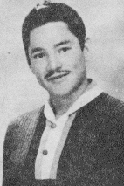
Javier Solis born Gabriel Siria Levario on Sept. 1, 1931, in Tacubaya, Mexico City; died April 19, 1966, Mexico City
With his incredible smooth baritone and impeccable air of authority, Javier Solis became Mexico's quintessential bolero ranchero singer in the late '50s. His versatile vocals could inject a wealth of emotions but perhaps more impressively, like the American pop singer Frank Sinatra, Solis could describe the hellish torture of love's addiction or the dark fear of being abandoned while projecting a cool, exquisite detachment.
Solis was born to a modest family in Mexico City though early on he was raised by his uncle Valentine Levario and his wife Angela, because Solis' father was reportedly a violent alcoholic.
Like many Mexicans of modest means, Solis began working as a child at a variety of jobs to help the family. He dropped out of school at 10 to work at a bakery and then a mechanic's shop. In his free time he played soccer, baseball and boxing. He practiced amateur boxing for six years, competing with the later-famous boxers Raton Macias and Jose Medel. While still in his teens Solis entered an amateur singing contest at Teatro Salon Obregon -- the prize was a pair of shoes -- and he won. He kept entering and winning until the owners paid him to sing at the place and not compete. Encouraged, Solis hooked up with longtime friend Pablo Flores and formed Trio Mexico but had little success. When he turned 16 he went to Puebla and sang with Mariachi Metepec for a year.
Returning to Mexico City Solis debuted at the famed Centro Tipico Guadalajara in the two-block square that was Garibaldi Plaza, the world-renowned gathering place for mariachis. It was during a stint at the Azteca Bar in downtown Mexico City that Solis' luck turned. One fortuitous night, singers Julito Rodriguez and Alfredo Gil of the famed Trio Los Panchos (see entry) heard Solis, then going by the name Javier Luquin. Sufficiently impressed, Rodriguez got Solis an audition with CBS Mexico. In short order, Solis then took his stage name of Javier Solis, signed a one-year contract with CBS and cut his first record in 1950. Shortly after, he was hired to work at Teatro Lirico where he met his future wife, the dancer Blanca Estela Saenz.
After Pedro Infante's death in 1957, Solis rose quickly as the undisputed ranchera king in Mexico. That Solis emerged after Infante passed away is no devaluation of Solis' natural ability. But clearly, Infante was such a powerful force, having recorded dozens of classics and appeared in 50-odd movies that he was a national icon. And like Jorge Negrete (see entry) before him Infante died young -- he was only 39. It would seem only natural to expect some of the love, admiration and national pride to be transferred to Solis. He was all of 25 at the time but Solis was already on an upward trajectory.
The big hit for Solis came in 1958 with "Cenizas," followed by "Payaso," two bittersweet songs that impacted solidly. The former described a great love that dies on the vine; the latter is the melancholy stance of maintaining an outward smile while one's world is collapsing."
continued at Wikipedia



Comments